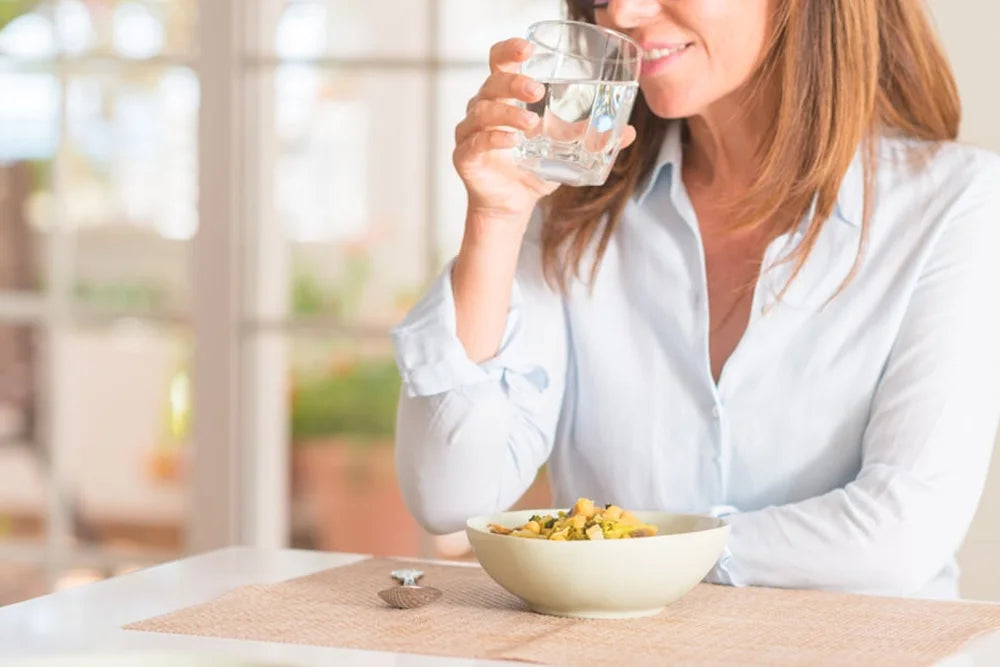
Hydration and Hunger: Why Drinking Water Before Meals Could Help You Eat Less
We’ve all heard that water is essential for staying hydrated, but did you know that drinking water before meals can also help you eat less? It sounds simple, but hydration can be powerful in appetite regulation and portion control. In this blog, we’ll explore why drinking water before meals can help you feel fuller, reduce calorie intake, and support healthy eating habits.
The science behind hydration and appetite regulation

How the body interprets thirst and hunger: Sometimes, our bodies confuse thirst with hunger, leading us to eat when dehydrated. When you’re thirsty, your body may send hunger signals, and you might eat more than you need. Staying properly hydrated helps ensure that your brain accurately signals true hunger, which can prevent unnecessary snacking or overeating.
The role of the stomach in feeling full: Drinking water before a meal can also help fill your stomach, giving you a sense of fullness. When your stomach expands with liquid, it signals your brain to feel satisfied, which can reduce your appetite during the meal. Essentially, water helps trick your stomach into thinking you’ve eaten more than you have.
Drinking water before meals: a natural appetite suppressant
The concept of pre-meal hydration: Drinking water before meals has reduced overall calorie intake. One study found that people who drank 16 ounces of water before meals ate fewer calories and felt just as satisfied as those who didn’t. It’s a simple and natural way to help manage your hunger levels without expensive supplements or drastic dieting.
Practical tips for adequate water intake: Aim for 16–20 ounces (about two glasses) of water about 30 minutes before eating to get the best results. This gives your stomach enough time to feel the effects of the water and help control your appetite during the meal. If plain water doesn’t appeal to you, try adding a slice of lemon or cucumber to make it more enjoyable.
Hydration and portion control: the link between water and eating less

Water as a tool for mindful eating: Drinking water before a meal encourages slower, more conscious eating. This lets your brain catch up with your stomach, helping you realize when you’re full. By drinking water first, you’re less likely to rush through your meal and more likely to pay attention to your hunger cues, which can result in eating less overall.
How hydration enhances satiety: Proper hydration plays a role in boosting satiety signals in the brain. When you’re hydrated, your body can more effectively communicate feelings of fullness, which means you’re less likely to overeat. This simple habit can go a long way toward maintaining healthy eating habits and controlling portion sizes.
The role of water in digestion and metabolism
How water supports digestion: Drinking water before a meal aids in the digestion process. It helps your body break down food and absorb nutrients more efficiently, contributing to a feeling of fullness. Proper hydration also supports the production of digestive enzymes, which makes the whole process smoother.
Metabolism-boosting: Water has also been shown to slightly increase metabolism. Hydrated bodies burn calories more effectively, and staying well-hydrated can help you use energy from your food more efficiently. A well-functioning metabolism can naturally support your weight management goals.
Overcoming the pitfalls of dehydration during meals
The negative effects of dehydration on hunger signals: When dehydrated, your body can struggle to send clear hunger signals, leading to overeating or cravings for high-calorie foods. Dehydration can also impair digestion, making it harder for your body to absorb nutrients and regulate hunger.
Hydration strategies for preventing overeating: To avoid these issues, prioritize hydration throughout the day—not just before meals. Keep a water reminder water bottle nearby, set reminders to drink water, and focus on maintaining proper hydration so that your body’s hunger and fullness signals are accurate.
When to drink water for maximum benefits
Timing of water consumption: For the best results, drink water 30 minutes before meals to give your body time to feel the effects. Avoid drinking too much water during meals, as it can dilute digestive juices and hinder the digestive process.
Water consumption and meal types: Drinking water before larger or high-calorie meals is especially beneficial. It can help control portion sizes and prevent overeating when you're particularly hungry.
Conclusion
Drinking water before meals is a simple yet powerful strategy to help you eat less and stay on track with your health goals. Whether you’re looking to control your appetite, reduce your calorie intake, or boost digestion, water can be your secret weapon for mindful eating. So next time you eat, try drinking a glass of water first—you’ll be surprised at how much it helps! Follow WaterH to find more tips for staying well-hydrated.















